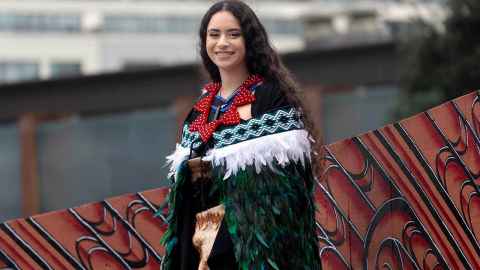Ōtara graduate combines academic skills with frontline mahi
5 May 2023
Ema Matahau-Haata Tu’akoi is taking her new degree back to her mahi, improving the mental health of Māori and Pacific communities.

Ko Ngongotahā rātou ko Tongariro, ko Moehau ngā maunga
Ko Utuhina rātou ko Tarawera, ko Waihou ngā awa
Ko Te Rotorua-nui-ā-Kahumatamomoe rātou ko Taupō-nui-a-tia, ko Tīkapa ngā moana
Ko Arawa rāua ko Tainui ngā waka
Ko Te Roro o te Rangi rātou ko Turipuku, ko Ngāti Moekino, ko Te Matahau, ko Ngāti Rautao ngā hapū
Ko Ngāti Whakaue rātou ko Ngāti Tūwharetoa ki Taupō, ko Ngāti Maru ki Hauraki ngā iwi
Nō Ma’ufanga rāua ko Holonga Tongatapu ahau hoki
Ko Ema Matahau-Haata Tu’akoi tōku ingoa
A new graduate wants to use her studies to promote mental well-being for Māori and Pacific whānau after seeing for herself the inequitable toll of mental illness.
Ema Matahau-Haata Tu’akoi (Ngāti Whakaue, Ngāti Tūwharetoa ki Taupō, Ngāti Maru ki Hauraki, Ma’ufanga, Holonga - Tongatapu) is a graduate with a Bachelor of Science, majoring in Psychology, including a module of sustainability.
The driving force behind her studies is her community of Ōtara, where she says mental health issues are common.
“I grew up in Ōtara, South Auckland, where my whānau and the majority of those around us were Māori and Pasifika. At a young age, I experienced a loss to suicide within my immediate whānau. It later led me down my own haerenga with mental illness," she says.
“For a long time, I thought this was unusual, that there was something wrong with me, and only me. As I entered my adolescent years, I realised this was actually a common or shared experience among our Māori and Pasifika whānau.
“I chose to study psychology because I wanted to understand these issues at a deeper level in order to give back to my people, my communities, and my whānau.”
Ema currently works as a community health worker at Te Whatu Ora, Counties Manukau. She’s also a research assistant with Whakauae Research Services, an iwi-led organisation of Ngāti Hauiti that conducts world-class research in the fields of rongoā, whānau ora, public policy and public health, for the ultimate benefit of Māori.
“I’m choosing to delay my plans of continuing into postgraduate studies so I can get experience in my several fields of interest – which is pretty much anything pertaining to the health and well-being of Māori and Pasifika.”
Ema says contributing to research as well as working "kanohi ki to kanohi" within communities is invaluable.
“As an undergraduate student, learning about historical trauma theory and the seemingly endless consequences of colonisation currently stand out for me. I’d love to run workshops within the community that encourage cultural reconnection for well-being, especially for our rangatahi Māori.”
In the words of one of Ema’s tīpuna, Te Roro o te Rangi of Ngāti Whakaue: Ruia taitea, kia tū ko taikākā anake!
“This famous war cry from the battle of Tawharakurupeti can be interpreted in many ways, but, to me, it serves as a reminder to stand staunch in our Māoritanga despite the inequities and inequalities that we may face. The blood, sweat, and tears that we shed to succeed is never for the success of ourselves alone, but for all of us.
“Know that we are all rooting for one another.”
Media queries
Te Rina Triponel | Kaitohutohu Pāpāho Māori, Moana nui a Kiwa
E: te.rina.triponel@auckland.ac.nz